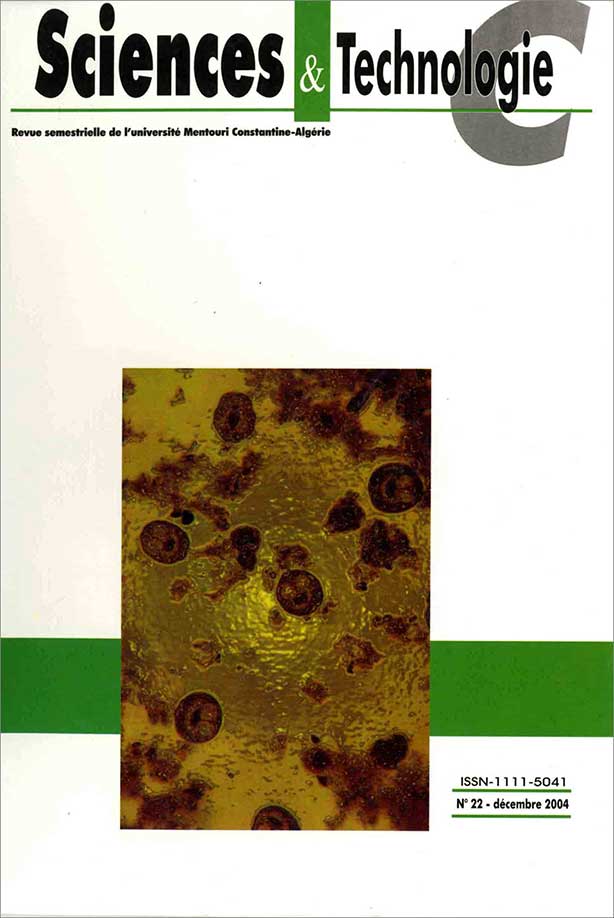EFFETS DU STRESS POST-TRAUMATIQUE ET DE LA DEPRESSION SUR LES INTERACTIONS IMMUNOENDOCRINIENNES
Keywords:
depression, cytokin, IL1, post traumatic stress disorder, testosteron, cortisolAbstract
Cette thématique vise à étudier les effets du stress post-traumatique et la dépression sur les capacités adaptatives de l’organisme ainsi que sur les interactions entre les systèmes immunitaires (SI) et neuroendocrinien (SNE). Les résultats montrent que, chez les sujets reconnus dépressifs, l’augmentation de la cortisolémie est corrélée simultanément à une immunosuppression (humorale et cellulaire) et à une baisse remarquable de la testostéronémie. En revanche, les sujets ayant subit un PTSD présentent une cortisolémie remarquablement faible avec une baisse de l’immunité (humorale et cellulaire) et également une chute de la testostéronémie. Les variations de la réponse immunitaire semblent être liées au sexe; on constate une immunosuppression chez les femmes déprimées par rapport aux hommes alors que ces derniers présentent une chute de la réponse immunitaire lorsqu’ils subissent un PTSD. Le SNE, via les axes corticotrope et gonadotrope, est capable de moduler la fonction immunitaire par la voie cognitive ou par des signaux venant du SIReferences
- Aardal-Eriksson E., Eriksson T.E., Thorell L.H., "Salivary cortisol, posttraumatic stress symptoms, and general health in the acute phase and during 9-month follow-up", Biol. Psychiatry, 50(12), Dec 15 (2001), pp.986-993.
- Blalock J.E., "The immune system as a sensory organ", J-Immunol., 132, (1984), pp.1067-1070
- Boscarino J.A., Chang J., "Higher abnormal leukocyte and lymphocyte counts 20 years after exposure to severe stress: research and clinical implications", Psychosom Med., May-June, (1999).
- Bulloch K., "Neuroanatomy of lymphoïd tissue : a review In: Neuromodulation of immunity", Guillernin R., Colin M. Medline - Chukt (eds)¬ Raven Press, ed, New York, (1985), pp.11-141.
- Comsa J., Leonliard H., Wekerle H., "Hormonal coordination of the immune response", Rev. Physiol. Biochem. Pharmacol., 92, (1982), pp.115-191.
- Cordier B., Sylvestre M. et Leyrie J., "Pathologie psychiatrique Post-¬traumatique", Edition 3, Techniques. Encycl. Med. Chir., Paris, France, Psychiatrie, 37, 329. A, (1994), 6p.
- Everson M.P., Kotler S., Blacburn W.D. Jr., "Stress and immune dysfunction in Gulf War veterans", Ann. N.Y. Acad. Sci., 876 (1999), pp. 413-418.
- Everson M.P., Shi K., Aldrige P., Bartulocci A.A., Blacburn W.D. Jr., "Is there immune dysregulation in symptomatic Gulf War veterans?", Z. Rheumatol., 2, (2000), pp.124- 126.
- Gotovac K., Sabioncell B.A., Robatic S., Berkit Deknhs D., "Hour cytomertic determination of glicocorticol receptor (gcp) expression in lymphocyte subpopulation: lower quantity of gcr in in patients with post traumatic stress disorder (PTSD)", Clin. exp: immunol.,131(2), pp.335-339.
- Grossman Z., Hberman R.B., Livant S., "Neuromodulation of immunity conditioning phenomena and the adaptability of lyphiride cells", lnt i Neurosci., 275 Medline ID : 94095364. 64, (1992), pp.1-4.
- Imura H., Fukata J.I., Mari T., "Cytokines and endrocrine function: an interaction between the immune and neurodocrine systems", Dm. endocrinol., 35, (1991), pp.107-115.
- Ironson G., Wynings C., Schneiderman N., Baum A., Rodriguez M., Greenwood D., Benight C., Antoni M., La Perriere A., Huang H.S., Klimas N., Fletcher M.A., "Posttraumatic stress symptoms, intrusive thoughts, loss, and immune function after Hurricane Andrew", Psychosom. Med., Mar-Apr. 59(2), (1997), pp.128-141.
- Irwin M., Dilin J.C., "impaired natural killer cell activity among depressed patients", Psychiatry Res., 20, (1987), pp.181-182.
- Kanter E.D., Wilkinson C.W., Radant A.D., Petrie E.C., Dobie D.J., McFall M.E., Peskind E.R., Raskind M.A., "Glucocorticoid feedback sensitivity and adrenocortical responsiveness in posttraumatic stress disorder", Biol. Psychiatry, Aug 15, 50(4), (2001), pp.238-245.
- Kawamura N., Kim Y., Asukai N., "Suppression of cellular immunity in men with a past history posttraumatic test disorder", Am. J. Psychiatry, 158, (2001), pp.484-486.
- Laudenslager M.L., Aasal R., Adler L., Berger C.L., Montgomery P.T., Sandberg E., Wahlberg L.J., Wilkins R.T., Zweig L., Reit M.L., Elevated cytotoxicity in combat veterans with long-term post- traumatic stress disorder : preliminary observations", Brain Behav. Imm., 12, (1998), pp.74-79.
- Lôo P. et Lôo H., "La dépression et le stress chronique", Masson, Paris, (1998).
- Pouvet C., Paupe J., Grisceili C., "Immunologie fondamentale et immunopathologie", Marketing, Paris, (1991), 2- 7298-910.
- Renaud M., Stress et axe corticotrope: Réflexions autour de la physiopathologie de la dépression et du PTSD", CHU Clermont Ferrand, Paris, (1999).
- Sabioncello A., Kocijan-Hercigonja D., Rabatic S., Tomasic J., Matijevic L., Rijavec M., Dekaris D., Immune, endocrine, and psychological responses in civilians displaced by war, Psychosom. Med., 62, (2000), pp.502-508.
- Schaison G., "Gonadotropin releasing hormone GnRH generalities, In: «Recent progress on GnRH and gonadal peptids», Bouchard P., Haouar F., Franchimont, Schartz B., (eds) — Elsevier, ed, Amsterdam, (1990), pp. 15-24.
- Wilson S.N., Van der Kolk B., Burbridge J., Fisler R., Kradin R., "Phenotype of blood lymphocytes in PTSD suggests chronic immune activation", Psychosomatics, 40, pp.222-225.
- Yehuda R. et T. Coll., "Increased number of glucocorticoids receptors number in post traumatic stress disorder", Am. J. Psychiatry, 148, (1995), pp.449-501.
- Yehuda R., Halligan S.L., Golier J.A., Grossman R., Bierer L.M., "Effects of trauma exposure on the cortisol response to dexamethasone administration in PTSD and major depressive disorder", Psychoneuroendocrinology, Apr., 29(3), (2004), pp.389-404.
- Yehuda R., Lowy M.T., Southwick S.M., Shaffer D., Giller EL Jr., Lymphocyte glucocorticoid receptor number in PTSD", Am. J. Psychiatry, 148, (1991), pp.499-504.


